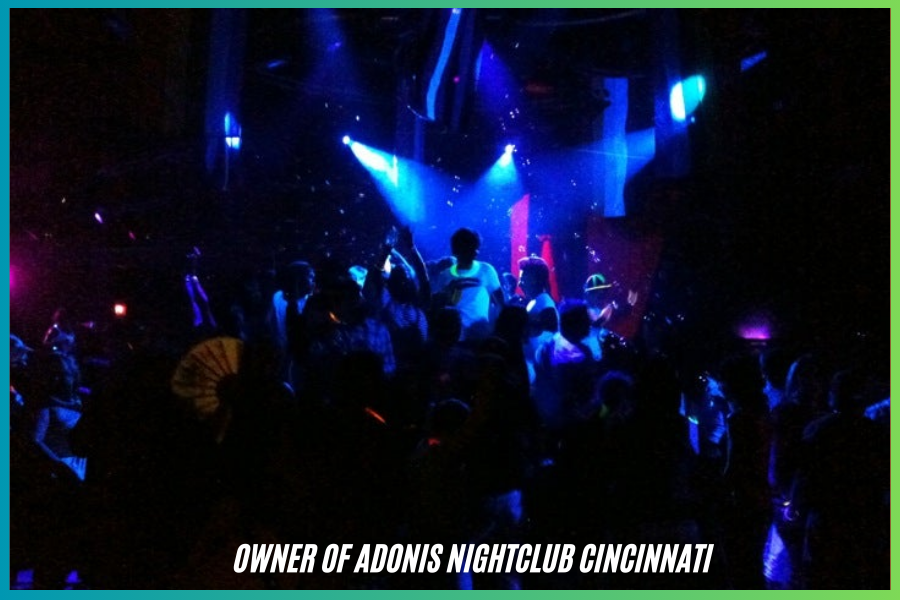Introduction
Owner Of Adonis Nightclub Cincinnati, once a key player in Cincinnati’s nightlife scene, was a beloved hotspot for many in the LGBTQ+ community and beyond. Known for its welcoming atmosphere, inclusive events, and unforgettable nights of dancing and entertainment, Adonis stood out as a unique venue that captured the essence of the city’s diverse social fabric. In this article, we’ll take an in-depth look at Adonis Nightclub’s history, what made it special, the reasons behind its closure, and its lasting legacy.
The Early Days of Adonis Nightclub
Owner Of Adonis Nightclub Cincinnati was founded in the early 1990s and quickly became an integral part of Cincinnati’s nightlife. Located at 4601 Kellogg Avenue in the city’s East End, Adonis was more than just a nightclub – it was a cultural hub for the LGBTQ+ community. Its location was strategic, offering both a vibrant party atmosphere and a touch of seclusion that made it feel like a hidden gem.
From the outset, the nightclub was known for its inclusivity and commitment to providing a space where people of all backgrounds could come together, dance, enjoy performances, and create lasting memories. The venue’s diverse appeal wasn’t limited to just one group; Adonis became a popular spot for everyone – from drag queens to partygoers to those seeking a safe space where they could be themselves without fear of judgment.
What Made Adonis Nightclub Unique?
One of the key features that set Adonis apart from other nightclubs was its open and inviting atmosphere. The venue’s interior design was both sleek and modern, with a large, open dance floor that allowed for a free-flowing energy. Guests could enjoy the music while surrounded by striking lighting, a high-quality sound system, and vibrant decorations that added to the festive ambiance.
However, what really made Adonis stand out was its entertainment offerings. The nightclub was renowned for its spectacular drag performances, which took center stage on various nights. Talented drag queens would perform live, giving guests a chance to witness stunning performances and vibrant costume changes that left the crowd in awe. These performances became a hallmark of Adonis, drawing crowds from across the region and even further afield.
Beyond the drag shows, Adonis was also known for its lively theme nights and special events. From ’80s dance parties to beach-themed bashes, the club had a little something for everyone. The inclusion of a large swimming pool in the venue’s outdoor area was another highlight that helped Adonis attract a wide range of visitors, particularly during the hot Cincinnati summers. The poolside vibes added a refreshing element to the nightclub experience, blending nightlife with a more relaxed, resort-like atmosphere.
The club’s success also stemmed from its ability to create a sense of community. It wasn’t just about the party – Adonis was a place where people could come together and connect. Whether they were meeting new friends or simply enjoying the company of old ones, patrons felt a strong sense of belonging at Adonis, which became known as a safe haven for those looking for an inclusive space to celebrate their identities.
Wiki
| Attribute | Details |
| Name | Adonis Nightclub |
| Location | 4601 Kellogg Avenue, Cincinnati, Ohio |
| Opened | Early 1990s |
| Closed | 2012 |
| Owner(s) | Group of individuals closely connected to the LGBTQ+ community |
| Type | LGBTQ+ Nightclub |
| Notable Features | Drag performances, theme nights, poolside area, inclusive atmosphere |
| Music Style | Dance, Pop, Top 40, LGBTQ+ themed events |
| Target Audience | LGBTQ+ community, general partygoers |
| Legacy | Influential in shaping Cincinnati’s LGBTQ+ nightlife scene, inspired future venues like The Birdcage |
| Replaced By | Cameo Nightclub (later closed), followed by The Birdcage |
| Cultural Impact | Played a significant role in providing a safe and inclusive space for the LGBTQ+ community in Cincinnati |
| Famous Events | Drag shows, theme parties, special events for LGBTQ+ patrons |
| Closure Reasons | Financial challenges, shifting preferences in nightlife, and emergence of new venues |
The Owner and Leadership of Adonis Nightclub
While Adonis Nightclub was renowned for its inclusive space, it is important to acknowledge the leadership that helped guide its success. The club was owned and operated by individuals who were deeply connected to the LGBTQ+ community, and this commitment to inclusivity was reflected in the venue’s day-to-day operations.
At the helm was a leadership team dedicated to ensuring that Adonis would always be a welcoming and celebratory environment. Their efforts were critical in maintaining a positive and open atmosphere, where everyone could feel safe to express themselves freely. The leadership also had a keen understanding of what was required to keep the club running smoothly – from managing the entertainment roster to organizing events and providing top-notch customer service.
Owner Of Adonis Nightclub Cincinnati worked hard to create a space that resonated with the Cincinnati community. By staying on top of emerging trends in nightlife, as well as responding to feedback from regular patrons, they were able to keep the nightclub’s offerings fresh and exciting. Whether it was through the addition of new events or changing up the playlist to feature the latest hits, Adonis kept people coming back for more.
The Reasons Behind Adonis Nightclub’s Closure
In 2012, Owner Of Adonis Nightclub Cincinnati, and its closure marked the end of an era for Cincinnati’s LGBTQ+ nightlife. While there were several factors that contributed to this decision, the changing landscape of nightlife and the difficulties facing many traditional clubs played a role.
Over the years, the nightclub industry had begun to change. The rise of new venues, competition from other entertainment options, and a shift in the preferences of partygoers meant that many nightclubs faced financial challenges. Adonis was no exception, and as the years went by, it became increasingly difficult for the owners to keep up with the changing trends in the industry. Despite its popularity, Adonis was not immune to these pressures.
Another key factor in the closure of Adonis was the evolution of the LGBTQ+ community in Cincinnati. As the city’s LGBTQ+ scene grew and diversified, many patrons began seeking new and different kinds of spaces to meet their needs. Some individuals who once frequented Adonis began exploring other venues that catered to different aspects of their social lives, leaving a void for the nightclub. The owners of Adonis ultimately decided to close the club’s doors and explore new opportunities, acknowledging that the business landscape had changed in ways that no longer made the club viable in its original form.
Adonis Nightclub’s Legacy and Impact
Despite its closure, Owner Of Adonis Nightclub Cincinnati, especially within the LGBTQ+ community. It was more than just a nightclub; it was a cultural landmark that provided a safe, inclusive space for countless individuals who were searching for community, freedom of expression, and a place to have fun.
Adonis played a significant role in shaping Cincinnati’s LGBTQ+ nightlife, providing a venue where people could gather, celebrate, and find solidarity. Its closure left a gap in the nightlife scene, but it also paved the way for other venues to step up and carry on the tradition of inclusivity.
One such venue that emerged after the closure of Adonis was Cameo Nightclub, located in the same area. Cameo took on many of the characteristics that made Adonis popular, including a strong focus on LGBTQ+ events and inclusive entertainment. However, Cameo, too, faced its own set of challenges, including public incidents that eventually led to its closure in 2017.
Even after the shutdown of Cameo, the spirit of Adonis continued to influence the local LGBTQ+ scene. The Birdcage, a bar in downtown Cincinnati, was founded by Guy Ulam, a former manager at Adonis. The Birdcage sought to carry on the inclusive legacy of Adonis by creating a safe space for the LGBTQ+ community. While new venues continue to rise and adapt to the evolving needs of patrons, the memory of Adonis still looms large in the city’s cultural history.
The Role of Nightclubs in Cincinnati’s LGBTQ+ Community
Cincinnati’s LGBTQ+ community has long relied on nightclubs and bars to create spaces of belonging, joy, and resistance. Nightclubs like Adonis allowed members of this community to build connections, form friendships, and escape the pressures of a world that didn’t always embrace their identities. In many ways, these venues served as sanctuaries where individuals could escape societal expectations and simply be themselves.
Over the years, as LGBTQ+ visibility has increased and social acceptance has grown, Cincinnati’s nightlife scene has evolved, but the significance of these spaces remains unchanged. Today, venues like The Birdcage continue to serve as pillars of the local LGBTQ+ community, carrying forward the same traditions that nightclubs like Adonis once represented. The impact of Adonis on Cincinnati’s nightlife culture cannot be overstated, and its influence continues to shape the way people come together to celebrate who they are.
Conclusion
Owner Of Adonis Nightclub Cincinnati venue; it was a cornerstone of the city’s LGBTQ+ community, offering a safe, inclusive, and vibrant space where people could come together to celebrate, connect, and express themselves freely. The nightclub’s legacy, characterized by spectacular drag performances, unique events, and a welcoming atmosphere, made it a beloved hotspot for many. While the nightclub closed its doors in 2012, its influence on Cincinnati’s LGBTQ+ nightlife scene remains significant. The club’s owners and leadership were instrumental in creating an environment where everyone felt welcome, setting the stage for future venues to carry on its tradition. Today, the memories of Adonis continue to inspire the LGBTQ+ community and the nightlife culture in Cincinnati, shaping the future of inclusive spaces in the city.
FAQs
1. Who was the Owner Of Adonis Nightclub Cincinnati?
The Owner Of Adonis Nightclub Cincinnati were a group of individuals deeply connected to Cincinnati’s LGBTQ+ community. Although specific names are not widely publicized, the management was dedicated to providing a welcoming and inclusive space for people of all backgrounds, particularly the LGBTQ+ community.
2. Why did Adonis Nightclub close?
Adonis Nightclub closed in 2012 due to several factors, including changing dynamics in the nightlife industry, financial challenges, and a shift in the local LGBTQ+ community’s social scene. As new venues emerged and tastes shifted, the owners decided it was best to close the club and explore other opportunities.
3. What made Adonis Nightclub unique?
Adonis Nightclub was unique for its vibrant entertainment, including live drag shows, theme nights, and a poolside area that provided a resort-like atmosphere. The club’s welcoming and inclusive environment was one of the key aspects that made it a standout destination in Cincinnati’s nightlife scene.
4. Did Adonis Nightclub have any impact on Cincinnati’s LGBTQ+ community?
Yes, Adonis Nightclub had a profound impact on Cincinnati’s LGBTQ+ community. It provided a space where individuals could gather, celebrate, and express themselves freely. The club played an essential role in creating a sense of belonging and was a vital part of the city’s LGBTQ+ nightlife culture.
5. What happened to the space after Adonis Nightclub closed?
After Adonis Nightclub closed, the venue space transitioned into Cameo Nightclub, which also catered to the LGBTQ+ community. However, Cameo eventually shut down in 2017. The legacy of Adonis continues to inspire new venues like The Birdcage, which aims to continue the tradition of inclusive spaces for the LGBTQ+ community in Cincinnati.
6. Is there a nightclub in Cincinnati similar to Adonis?
Yes, The Birdcage, which opened in 2018, is one such venue that carries forward the spirit of Adonis. Former Adonis manager Guy Ulam played a key role in the creation of The Birdcage, which continues to serve as a popular LGBTQ+ venue in downtown Cincinnati.
7. What is the significance of Adonis Nightclub in Cincinnati’s history?
Adonis Nightclub holds significant cultural and historical value as it was one of the primary venues in Cincinnati that catered specifically to the LGBTQ+ community. It was a safe space for socializing, celebrating, and fostering connections, making it a crucial part of Cincinnati’s LGBTQ+ nightlife and community history.
Discover the latest news and updates on Magazine Format




